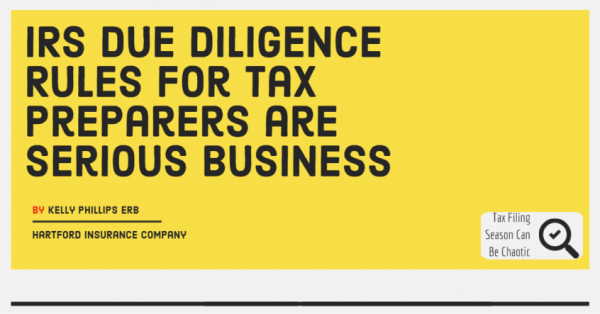IRS Due Diligence Rules for Tax Preparers are Serious Business

(note from the Editor: the following was sent to the NSTP from the Hartford Insurance Company with permission to share with our members.)
Jan. 23, 2020, 4:45 AM
Tax filing season can be chaotic.
According to the Internal Revenue Service, 155,798,000 individual income tax returns were received in the 2019 filing season, with over half of those returns (80,630,000) filed by tax professionals. That doesn’t include the number of other tax returns filed (like business and partnership tax returns, excise, estate, and gift tax returns, or state tax returns) or other tax compliance activity.
Bottom line: Tax professionals are busy year-round.
In the months following the last tax filing season, the IRS began reaching out to tax professionals to remind them of the importance of understanding tax law and due diligence responsibilities. The agency particularly focused on tax returns with refundable tax credits like the earned income tax credit and the additional child tax credit, as well as head of household (HOH) filing status claims. Since those credits can result in sizable tax refunds, they are ripe for abuse—even by tax preparers.
In an effort to reduce the instances of inaccurately prepared returns, the IRS mailed letters to tax preparers—specifically targeted and based on tax filing statistics for the prior tax year.
The IRS examined the number of returns completed by the same preparer with a high likelihood of refundable credit and HOH filing status errors. Preparers who have a high number of inaccurately prepared tax returns may have received a letter.
In the letter, the IRS advises that it believes the tax preparer submitted returns with inaccurate claims. The letter highlights the consequences of failing to follow the rules: Paid preparers are required to comply with all due diligence requirements, and can be subject to financial penalties if they don’t. Depending on the circumstances, a paid preparer can also be subject to audit, suspension, or termination of e-filing privileges.
The letter is considered a warning shot for potentially sloppy tax preparers. It’s possible that the errors were simply mistakes. However, if you receive a due diligence letter, you should be aware that the IRS will continue to monitor tax returns that you prepare in the future claiming these credits.
Your professional reputation may also be at stake. Beginning after the last tax filing season, the IRS also sent letters to taxpayers. Again, the letters were targeted.
This time, the IRS focused on taxpayers whose previous returns prepared by a paid tax preparer may contain errors, especially concerning the earned income tax credit (EITC), child tax credit (CTC)/additional child tax credit (ACTC), and/or American opportunity tax credit (AOTC). The letter reminded taxpayers that they are ultimately responsible for the accuracy of their own tax returns. If there are mistakes, the taxpayer may need to file an amended return. As an added touch, the IRS provided tips for choosing a tax preparer with the letter (ouch).
The letters won’t stop during the tax filing season. The IRS will continue to monitor tax preparers to ensure that they’re following the rules. If the agency notes a pattern of problematic returns, they will contact you to let you know that you may not have met your due diligence requirements. They may also alert that you’re missing Form 8867, Paid Preparer’s Due Diligence Checklist, when you submitted or e-filed a client’s tax return.
You are required to complete and submit Form 8867 with each return if you are paid to prepare a tax return claiming the EITC, CTC/ACTC, credit for other dependents (ODC), AOTC, or HOH filing status. There is a $500 penalty for not meeting this requirement. The penalty is adjusted annually for inflation under tax code Section 6695(g): for returns prepared for 2020, the penalty is $530. That penalty is per credit/HOH filing status per return, which means that you could be required to pay up to $2,120 per tax return.
Even if you aren’t subject to a penalty, don’t skimp on your due diligence requirements. The Form 8867 checklist isn’t a substitute for asking the right questions when preparing a return, and it doesn’t cover all of the eligibility requirements. It’s still your job to know the rules as well as when they apply.
If you need help, the IRS has resources available, including an online Due Diligence Training Module. The refresher may also qualify you for continuing education credit. Additionally, the IRS encourages preparers to take advantage of updated content available at the Nationwide Tax Forums and other professional education opportunities.




